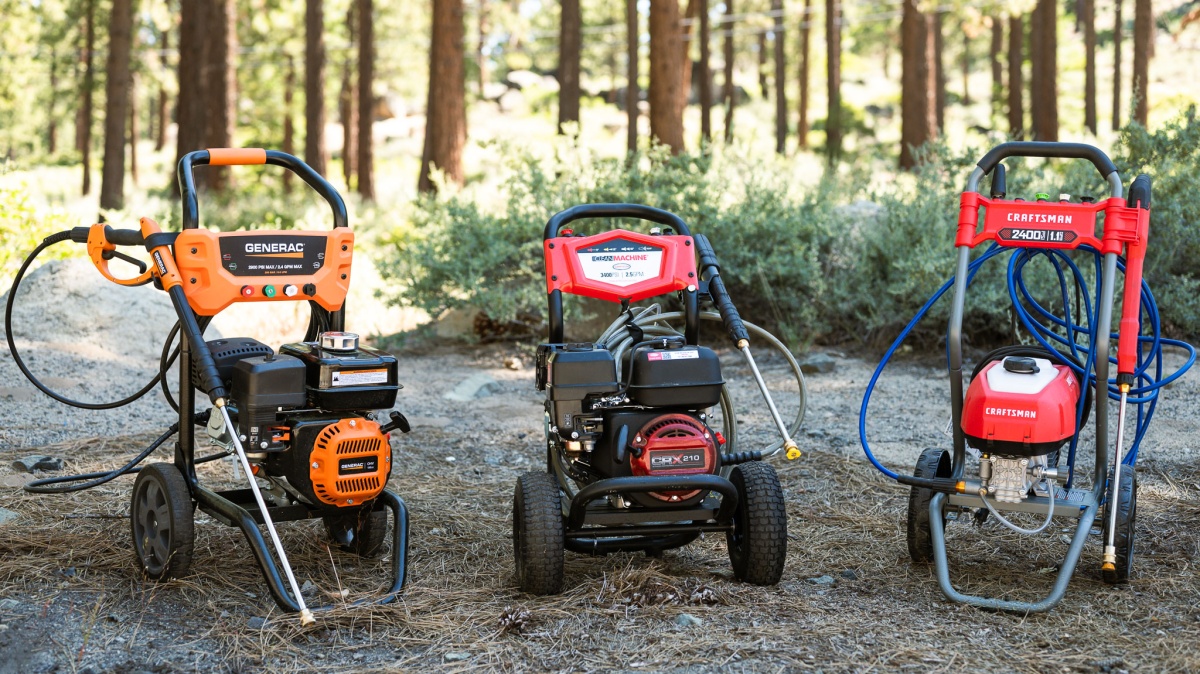
Power washing can transform your property — but only if you have the right tool for the job. Walk into any hardware store or search online, and you’ll find dozens of pressure washer models, brands, and specs. 😵💫
Gas or electric? PSI or GPM? What’s a turbo nozzle?
Don’t worry — this guide breaks down the essentials so you can choose the perfect pressure washer for your home, lifestyle, and budget. 🧼💪
🔌 Gas vs. Electric: Which One Should You Get?
Let’s start with the big question.
⚡ Electric Pressure Washers
- Lower PSI (1,300–2,000 PSI)
- Quieter and more lightweight
- Great for small jobs: cars, furniture, patios
- Requires nearby outlet 🔌
- Low maintenance
💡 Best for: Small to medium tasks around the home and users who want convenience.
Browse Amazon For Electric Pressure Washers Here
⛽ Gas Pressure Washers
- Higher PSI (2,500–4,000 PSI and up)
- Portable, no cords
- Ideal for large jobs: siding, concrete, fences
- Louder, heavier, and needs oil/gas
- More maintenance required
💡 Best for: Bigger cleaning jobs, contractors, or homes with frequent grime or mold buildup.
Browse Amazon For Gas Pressure Washers Here
🔢 Understanding PSI and GPM
When choosing a pressure washer, two numbers matter most:
💥 PSI (Pounds per Square Inch)
This measures force. The higher the PSI, the more power you get to blast away tough grime.
- 1,300–1,800 PSI: Light duty (cars, furniture)
- 1,800–2,500 PSI: Medium duty (siding, patios)
- 2,500–3,500+ PSI: Heavy duty (driveways, decks, large areas)
💧 GPM (Gallons per Minute)
This measures water flow. More GPM = faster cleaning.
- 1.2–1.8 GPM: Light jobs
- 2.0–3.0+ GPM: Faster rinse, better for big jobs
💡 Pro Tip: Multiply PSI × GPM to get the Cleaning Power Score.
🧽 What Will You Be Cleaning?
Match your washer to your typical tasks:
| Task | Recommended PSI |
|---|---|
| Cars, bikes, grills | 1,300–1,800 PSI |
| Patios, fences, decks | 2,000–2,500 PSI |
| Siding, brick walls | 2,500–3,000 PSI |
| Driveways, commercial jobs | 3,000+ PSI |
📌 If you’re cleaning multiple surfaces, opt for a washer with adjustable pressure or a variable spray nozzle.
🔫 Nozzle Types Matter More Than You Think
Pressure washers come with interchangeable nozzles — and each one changes the shape and power of the spray. Here’s a breakdown:
- 0° (Red): Intense, focused blast 🔴 (rarely used — can damage surfaces)
- 15° (Yellow): High-pressure striping 🟡 (good for concrete)
- 25° (Green): Medium spray 🟢 (great all-around)
- 40° (White): Wide, gentle spray ⚪ (for siding and windows)
- Soap (Black): Applies detergent 🧼
💡 Pro Tip: Start with 40° and work your way down only if needed.
🧰 Bonus Features Worth Considering
When shopping, look for these useful features:
- Onboard detergent tanks 🧴
- Hose reel or holder for easy storage
- Quick-connect nozzles for speed
- Wheels for mobility
- Telescoping wands (great for reaching 2nd stories)
🚨 Avoid super-cheap units that offer high PSI but low build quality — they often burn out quickly or leak.
💰 How Much Should You Spend?
Here’s a rough breakdown:
| Type | Cost Range |
|---|---|
| Light-duty electric | $100–$200 |
| Medium-duty electric | $200–$300 |
| Heavy-duty gas | $300–$600+ |
| Commercial units | $800–$2,000+ |
If you’re using it occasionally for basic home upkeep, a $200–$300 unit will serve you well. Frequent or professional use? Go gas and invest in quality.
🌟 Best Brands to Look For
Some trusted brands in the pressure washer world include:
- Sun Joe – Affordable, beginner-friendly 🟢
- Greenworks – Eco-conscious electric units 🌱
- Simpson – Durable gas-powered options 🔧
- Generac – High-performance and commercial use 🚧
- Ryobi – Homeowner favorite with good warranties ✅
Final Thoughts 🔍
The best pressure washer for you depends on what you’re cleaning, how often, and how much power you need. Whether you’re blasting away mildew from your deck or freshening up your driveway, the right machine makes all the difference.
So before you grab the first washer on sale, consider the PSI, GPM, and features that match your needs. Invest once, and clean with confidence for years to come. 🧼🚀



